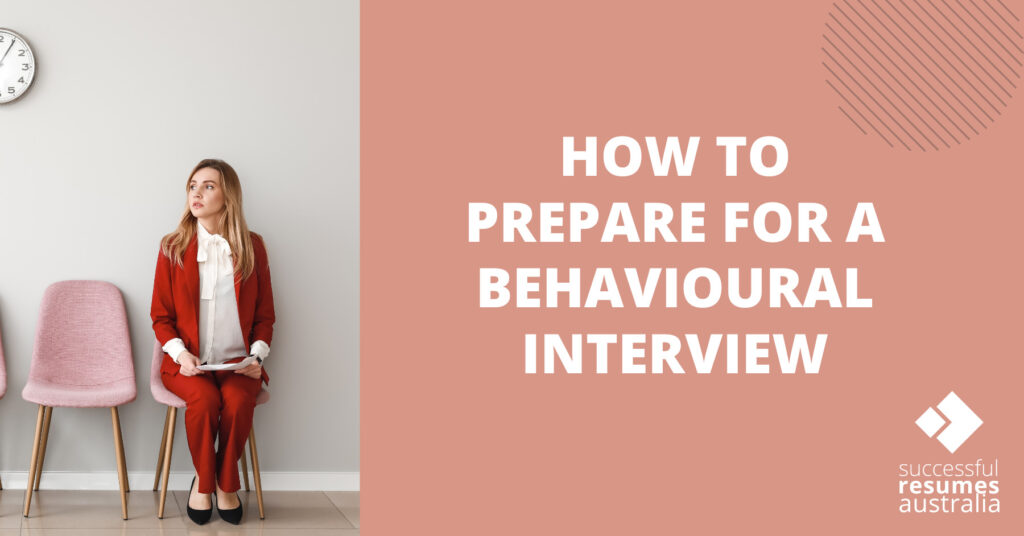Why Tailoring Your Resume Can Help Land You The Job

If your job search strategy involves firing off the same resume and cover letter for every application, it might be time for a re-think. Although the idea of sending your standard resume is appealing from a time and effort perspective when it comes to job applications, content is critical but relevance is king. The most relevant resume is one that’s customised to the role or job opportunity. So how do you minimise the time it takes to tailor your resume? We’ve laid out a few simple steps to help you create a winning resume, every time. Luck = Preparation + OpportunityThe key to job search success is preparation. We’ve worked with thousands of clients who have found a job they want to apply for but haven’t prepared a resume in years. It becomes a mad dash to submit the application before the deadline and while we give it our best, the best would have undoubtedly been better if we have more time. The perfect time to prepare your resume is when you’re not looking for work. Our experience is that people approach the process with more clarity and confidence when they don’t have the stress of a deadline looming. Develop a Master ResumeThe first step to being prepared is to connect with a professional resume writer to develop your master resume or foundation document. The resume writer will work with you to create a document that contains all of the information a recruiter or hiring manager will want to know including: an evidence-based summary of your career, experience and qualificationsa list of your skillsdetailed employment history, complete with outcome focussed statements on how you have solved problems or contributed to the success of your previous employerseducation and professional development coursespersonal detailsWe recommend clients update this document annually (often coinciding with performance reviews) so that the content stays up to date. Adapt Your Master ResumeThis master resume is a complete career history. Once completed, you can use this generic (and normally longer) document as your starting point. You can then adapt it to the position you would like to apply for. To do this, start by looking at the job description. Make a list of the keywords. These include the skills, experience or qualifications that the employer is looking for. Rank these keywords based on your strengths. Put the keyword you have the most experience or success in at the top of the list and work your way down. Now you want to customise the various elements of your resume. This includes the headline statement (if you have one) and career summary, and the highlights from your employment history. To keep your resume concise, we suggest using a maximum of six bullet points in your career synopsis or summary. Select the top six keywords and create a bullet point for each. The bullet point should refer to the keyword and then provide evidence or proof of your claim. For example, if the job advertisement says:This global leader is looking for a Sales Engineer with at least 6+ years’ experience to support the Sales leader in Australia and New Zealand drive exponential growth in the region. The Sales Engineer must have a Bachelor degree in Electrical Engineering, Electronics or Computer Science and will provide expert level support to enterprise customers. They will work directly with Sales Directors and Solutions Architects to develop and recommend appropriate solutions for customers. We would pull out these keywords:Sales Engineer 6+ years’ experience Bachelor degree Drive exponential growth Enterprise customers Work with Sales Directors and Solutions Architects Develop solutions Then use them to create an introductory paragraph that says:Degree qualified sales engineer with over ten years’ experience supporting ABC company grow from a $200k entity to a $14m business by designing innovative technical solutions that meet the evolving needs of enterprise customers. If we want to use bullet points, we take the highest ranked keywords to create succinct points like below. In this case, we used the keywords Sales Engineer, 6+ years’ experience and Bachelor degree in Electrical Engineering, Electronics or Computer Science. Tertiary qualified Communication Engineering and Information Technology professional with eighteen years’ experience leading product sales in a high growth environment Even if you left the rest of your master resume unchanged, highlighting the keywords from the job description in your summary immediately shows the reader that you have proven experience and success in a similar role. However, continuing to tailor your master document could add even more value. We suggest looking at the responsibilities and achievement bullet points under each role. Ifis a good idea to re-order them in order of relevance (again, use the keywords as a guide). If you find the resume is too long, delete the bullet points that are not relevant to the advertised role. Of course, if you are using your resume to leverage your network, seek a secondment or promotion, or facilitate a career change, you may need to customise the resume even further. However, the principles are the same. If you would like support creating a role-specific job application, send us a message and one of our experienced professional resume writers will be in contact.
What’s the difference between a resume and a CV?

With Australians using resume and CV interchangeably, it’s no wonder there is a common perception that the two words mean the same thing, but do they? Most employers in Australia would say there is little difference between a resume and CV. A quick scroll through Seek shows that although resume seems more popular, job advertisements commonly use either term when asking candidates to submit an application. In India, South Africa and many Asian countries the terms are also used synonymously. Although it is often said that resume is used more in the private sector while CV is preferred for public sector roles. Despite the wide amalgamation, CV’s and resumes started out as quite different documents and in some parts of the world, they still are. We’ll give you an overview below. Curriculum Vitae Latin for the “course of (one’s) life” a curriculum vitae, often shortened as CV, is a thorough chronological document that details your education and employment history. The term CV is used almost exclusively in the UK, Ireland, Europe, and New Zealand with resume being uncommon. Europe is so serious about the CV, they have an official European Union format to improve the transparency of qualifications and make it easier for cross border workers in the EU. Normally spanning a minimum two pages (but can be more than 10), a CV is typically longer than a resume and gives a more in-depth look into your work history, accomplishments, and skills. The format is structured, the design is minimalist and the document is completely functional. Popular in academia, CV’s almost always include more detailed information on your academic background. This could include your schooling, degrees, research, awards, presentations, publications, memberships and other achievements. Resume The word Resume originated from French résumé which means “to summarise”. In 1482, Leonardo da Vinci wrote a letter to a potential employer, Ludovico il Moro, Duke of Milan. Credited as the world’s first résumé, the letter lists how Leonardo’s skills as an experienced contriver of instruments of war could benefit the Duke. As the default job application document used in the United States and Canada, Resumes are most often a one page summary of your education, work history, accomplishments, and skills. Due to the length, they are often written specifically for a role and focus only on relevant information. There is definitely no verbose descriptions of your achievements and bullet points are kept to a minimum. They are normally either chronological, functional or combination format. In recent years, they have become design led. Contemporary styles using infographics, images and colour blocks have started hitting employer desks in the hope they will stand out. Which one should you have? CV or Resume? We recommend you do what Australians do well! Take the strengths of each and blend them into a new and improved version. We’ll name this the résumé vitae, a summary of your life. Employers might only spend a few seconds assessing your application but when they do, they are looking to answer the question ‘why you?’ What makes you a great candidate? This information is almost always in the detail. Employers want to see evidence of how you contributed to the success of previous employers because it’s a good indication of what you will bring to their table. This is the level of detail you would find in a CV. The expectation in Australia is that most resumes are two, three and occasionally even four pages, whilst graduates or career starters can submit a one or two-page resume. Unless you are applying for a role in academia, employers probably don’t care too much about the subjects you studied, your research topics or your marks. This is more consistent with a resume where only the qualification and the institution are sufficient. Although you can blend your styles, employers still prefer the chronological style of a CV. It is more transparent and easier for employers to read. Finally and most importantly, the resume principle of writing to the reader is always going to be a winner. If you want an employer to think you are the perfect candidate, make sure your job application matches your experience to the job description advertised. Successful Resumes have been helping people in Australia get the job they want for more than 25 years. We are experts at writing resumes and CV’s that help you get ahead. For more information about our services, get in touch below.
Are Game Based Assessments the Future of Recruitment

In a quest for the perfect employee, companies and recruiters are always looking for new ways to predict if a potential candidate is going to be a superstar employee. With prediction considered the ‘holy grail’ of recruitment, hiring managers and recruiters are now turning to game-based assessments to see if it can predict if someone will be successful. What are game-based assessments? Hailed as the next generation of psychometric assessment and powered by neuroscience, game-based assessments are pre-hire assessment tools that have been designed as interactive games. By taking the player (candidate) through a series of tasks, the behavioural assessments provide an objective, data-driven and bias-free way to assess a candidate’s fit for a role. The game measures a player’s cognitive ability including logic, comprehension and multitasking, as they navigate through each level. The game then analyses how the candidate performed and provides feedback on whether the candidate is likely to be successful in the role. It takes into account factors like how the candidate naturally approach problems and reacts to changes in requirements, risk and uncertainty. Why are they becoming more popular? Decades of studies consistently show that cognitive ability is the best predictor of job performance. In fact in their study “The Validity and Utility of Selection Methods in Personnel Psychology: Practical and Theoretical Implications of 100 Years of Research Findings” Schmidt, Oh, & Sha‑er found that cognitive ability was 6 times more predictive than years of education, four times more predictive than work experience and three times more predictive than reference checks. With recent advances in data science, companies like HireVue have radically changed how cognitive ability can be measured. In less than 20 minutes, candidates engaging in game-based assessments provide thousands of data points from user interactions. The games record things like how long a candidate spends on a problem or when they second guess answers. Using data, it then determines which candidates have the highest potential to make an impact in the organisation. Traditional psychometric testing is about as exciting as a trip to the dentist (and the bill to follow), whereas game-based assessments can make the user experience more fun and engaging. They are a more novel and accessible way for employers to assess your aptitude and personality traits. How do you prepare? The great news is that you don’t need to be an experienced gamer to perform well in game-based assessments. In fact, you don’t need any prior gaming experience at all. The employer will send you a link which will give you access to the game. You will play the game on your phone, tablet or desktop computer. There is nothing you need to study or practice beforehand, but there are some important tips for having a great experience:
Why Hybrid Resumes Are The Best Way To Showcase Your Potential

A hybrid resume, sometimes called a combination resume, is a contemporary resume format. It combines the traditional reverse-chronological format with a functional design to meet the demand for timelines while showcasing your skills and accomplishments. The layout of a hybrid resume includes a functional summary in the key document real-estate followed by a more traditional presentation of your specific work experience. This section follows the reverse-chronological format and should include your roles, employers, dates and how you contributed to the success of the company or team in the role. Why use a hybrid resume The hybrid resume format is the preferred format of recruiters and hiring managers because it allows you to highlight your relevance for the role (through demonstrating the functions or skills that the employer wants) while still providing the concrete evidence of your job history. While it can be harder to hide gaps in your resume using the hybrid format, the reality is that no-one, except jobseekers, likes functional resume formats. They look like you are trying to hide something. Hybrid resumes give you the opportunity to highlight achievements from across your entire career. Where a reverse chronological resume focuses on skills from the last one or two roles, the hybrid format using a summary section can showcase accomplishments relevant to the position you are applying for regardless of when they were developed and demonstrated. Because of this, hybrid resumes can be effective for people who are considering a career change. Who should use a hybrid resume Our view is that almost all job applicants would benefit from a hybrid or combination resume. This format allows you to quickly demonstrate how you have the right skills and experience to be successful in a role. If recruiters and hiring managers spend six seconds to scan your document, you want the most relevant and convincing information to be front and centre. Students, new graduates and entry-level job seekers. When you have a short work history, the hybrid resume allows you to focus on the skills and attributes you bring to the table. You can provide evidence of these skills using examples from school, university, sporting and a variety of life scenarios. People looking for a career change. Like the functional resume, the hybrid resume also places a strong value on skills and experience. The summary section is ideal to highlight the relevant or transferable skills that would make you successful in the role. You can also include a bullet point in the summary explaining why you are looking to change careers. This will help readers understand why you applied for the role. People returning to work. The hybrid resume style removes the emphasis from the fact that you have not been working for a while. It gives you an opportunity to sell your value and the reason why you are the best candidate for the job before they even get to your career break. Career leapers. If you want to jump a few rungs up the ladder, a hybrid resume is the perfect format to showcase your capability. Using clear examples of how you have contributed to a company or team success, you can demonstrate your value and invite the potential employer to leverage your abilities. Looking for the perfect resume? We can help. Successful Resumes has been preparing professionally written CV’s and resumes for people in Australia for the last 25 years. Submit an enquiry below to have a no-obligation chat about your resume.
How to Track Your Work Accomplishments

Some say that career success is dependent on luck. Others say that we make our own luck and that the harder we work – or in this case the more we prepare, the luckier we get. So how do we prepare for opportunities that bring us career luck? In the everyday tasks of balancing home, careers and wellbeing, we’re often too busy striving for the next goal to routinely reflect and record our accomplishments. Most employees don’t keep records of their workplace wins. Fewer people keep track of how the organisation is performing using information like sales growth, cost efficiencies, expanded offerings etc). Building a habit of tracking your work accomplishments increases confidence, boosts motivation and prepares you with the right evidence for your next opportunity. Regardless of where you are in your career, building a bank of accomplishments, success stories or career narratives can be incredibly helpful when you need to: Update your resume.Gone are the days where writing your resume was as easy as listing your responsibilities. A standout resume not only articulates what you were responsible for but extends to how you did it and the outcomes. In 2020 a successful resume uses metrics to provide the evidence that demonstrates how, in your role and through your actions, you contributed to the success of the organisation. Answer interview questions.Most interviews include behavioural questions that you need to answer with examples. Keeping a record of your accomplishments can be a great tool to remind yourself of situations and successes you may have otherwise forgotten. Negotiate for promotion or raise.When backing yourself and arguing that you deserve more, it’s essential to show up armed with examples of how you delivered more than was expected. Prepare for performance reviews.While most managers keep records of their employees wins (and losses) you can’t expect them to remember all the contributions you have made in detail. Going into a performance review with ready examples that reference how you have contributed to the success of the business/organisation will undoubtedly lead to a better result. What type of work accomplishments are important to keep?If you have left work thinking ‘wow that was a really good day’, it’s likely there was an accomplishment there! You can include things like supporting a team member, so the client got a better outcome, being acknowledged or appreciated by your manager, securing a new client or contract etc. It is also helpful to keep organisation records like annual reports, budgets, announcements or media relating to your area of the business. Regardless of whether you are recording a personal accomplishment or an organisation success, it is important to include action verbs, concrete metrics, and clear articulation of the impact you made. Some examples of achievements to track include:Financial goals you’ve reachedThis can be through sales growth or cost reduction. Include the relevant metrics like ‘how much’ either as a number or a percentage. Also, include how you did it. Was it through improving or changing a system, process or strategy? Challenging situations with clients and/or co-workersFocus on situations that you feel confident have been resolved. How did you resolve it? What has been the impact of fixing the problem? If it didn’t end well, what was the lesson learned? Think critically to identify how you could change your approach to create a better outcome next time. Completing tasks and projects on time and/or budget.Having a strong record of completing projects on time is a testament to your ability to plan ahead. It also demonstrated skills like organisation, managing time and coordinating stakeholders. Stepping upIf you have been invited to step into a management position or a role with more responsibility, note it down. It demonstrates trust in your capability to deliver additional responsibilities. Exceeding expectationsTrack the times you have confidently delivered more than was expected or have taken on duties outside your scope. Winning an award or receiving an acknowledgementIf you have won an award for best-performing employee four years in a row, record it. Even if you won two movies tickets for helping out, record it. They are all a great way of showcasing your employer’s acknowledgement and appreciation. Holding a committee or board positionThis is a great way of demonstrating you are a leader who’s willing to contribute time and experience to support a good cause. How to record your accomplishmentsKeep it simple is the answer to successfully recording your accomplishments. You can use an app like Evernote or Notes or create Word or Google Doc to record your workplace wins. If you would prefer a more structured or dedicated repository, use an accomplishment tracker. We have created an easy to use Accomplishment Tracker template (Word document) that you can download here. Save this to your desktop and every time something great happens, take a minute to jot it down. Accomplishment Tracker It might seem like another thing to do in an already busy life but keeping good career records is an investment worth making for your future success. More importantly, it will save you lots of time when it matters most and will help you get the most out of working with a resume writer. Does your resume showcase your work accomplishments and the value you bring to an organisation? Get a free resume critique to find out.
How to Prepare for a Behavioural Interview

What is a Behavioural Job Interview?The purpose of a successful resume is to get you an interview. It’s your performance at the interview (and references and assessment results) that win you the job. A behavioural job interview is premised on ‘the best predictor of future behaviour is past behaviour’ and asks you what you did in a range of scenarios. Rather than asking how you would behave in certain scenarios, they ask how you did behave. Behavioural questions use this logic to help the interviewer understand how you have acted in specific work-related situations so they can interpret your fit for their role, team and company. The interviewer will identify the core behaviours or traits that are important to the role and then ask questions that encourage you to provide evidence that you have the right capability or experience to be successful in the job. What do Behavioural Questions Look Like?Most behavioural questions will start with something similar to “Can you tell me about a time when you…” Example questions are: Describe a stressful situation at work? How did you handle it?Tell me about a time you had to solve a difficult problem. What did you do? What was the outcome? Do you wish you had done anything differently?What process have you used to check that you have the right details from a customer?How have you handled a situation in the past where your manager has “changed the goalposts”?Have you ever had to convince your co-workers to try a different idea or approach? How did you do it?When was the last time you had to think “outside the box”, what was the outcome?Can you tell me about a project you initiated? What did you do and what was the outcome?Have you ever been in a situation where there was conflict in your workplace? How did you handle the situation?How to Answer Behavioural QuestionsThe trick to a good interview is to take your time. After the interviewer has asked the question, take a short pause (and a deep breath to calm your nerves). Review the question in your mind and decide on the skills you need to focus on. Use your bank of career narratives that we discuss below, to find an example or anecdote from your work experience that best demonstrates that skill. When you slow the pace of an interview down, you are more likely to respond to the questions clearly and completely. Without taking time to pause, people tend to speak faster, get entangled in their words, run off course or forget the actual question half-way through a ramble. More importantly, if you’re too busy thinking of an answer while the interviewer is still asking the question, you risk missing key elements and not delivering the answer they really want to hear. Prepare Ahead with a Bank of Career NarrativesUmms, ahhs and a general lack of clarity can be kryptonite to a good interview. Avoid the potential pitfalls by developing a series of career narratives that you can use across a range of questions or scenarios. While most of these narratives should describe situations or experiences where you really shined, it’s also important to have a few examples of challenges you have had to navigate in the workplace. Ideally, these examples of challenges still end with a positive outcome or a clear lesson learned so that you can demonstrate how you have grown from the experience. The best way to develop your narratives is to reflect on times at work where you felt like you did a really good job. Once you have the experience, break it down using a simple formula. Use a Formula to Create Good StoriesThere are lots of formulas and the STAR approach is probably the most popular. We think you can simplify it even more with a good Australian SAO : Situation, Action, Outcome. Set the scene or situationTalk about your action or ideaClose with the outcomeEvery good story starts by setting the scene – this is normally describing the situation or problem In the next sentence talk about the things you did to help fix the problem or improve the situationFinish with how your actions helped the organisation, improved something or fixed the problem To give an example, we’re going to use an experience of keeping volunteers informed.Set the scene: We had an excellent team of volunteers but it was time-consuming to update them on training requirements, process changes and upcoming volunteer opportunities. We were spending as much time managing the volunteers as we were benefiting from their support. Talk about your action or idea: I decided we needed a better approach to information sharing and felt a quarterly newsletter would suit our volunteers. They agreed on the benefits and we established the newsletter with all information they needed to know, sign-up sheets for upcoming events, health and safety guides, volunteer appreciation, birthday announcements and more. Close with the outcome: We received excellent feedback from the newsletter and many volunteers reported that really enjoyed reading the personal stories we featured. We increased the number of people signing up to volunteer at events by 25% because more people understood how to do it. We also improved the safety of volunteers with no reported OH&S issues since the release of the newsletters. This narrative could be used across a range of questions including:Tell me about a time where you had to solve a difficult problem.Describe a situation in which you recognized a potential problem as an opportunityWhat have you done in the past to minimise workplace stress?Tell me about a time that you used your written communication skills to make an important point?When was the last time you thought “outside the box” and how did you do it? Why?Tell me about a problem that you’ve solved in a unique or unusual way. What was the outcome? Were you happy or satisfied with the result?Describe a project or idea that was implemented as a result of your efforts.Tell me about a time when your
Kick Start Your Career – Resumes for Graduates and School Leavers

Your resume is your first chance to make a good impression with a potential employer. It is the sales pitch you need to be invited to interview. Research tells us that employers spend a very short time reading resumes. They often have hundreds of resumes to review and don’t read them in detail. As a jobseeker, you need to make sure you capture their attention quickly and keep it by presenting the right information in the right way. Resumes for Graduates and School Leavers When you’re starting out, you won’t have a lot of experience to include on your resume, but don’t worry, employers won’t be expecting it. Focus on your potential and demonstrate it through telling them your career goals and academic achievements along with any projects or extracurricular activities you have worked on. We’ve listed some key strategies to help you start your career on the right foot: Make sure they can contact you Include your name, address, phone number, and email at the top. This is your marketing document, so only use a professional sounding email address that includes your name. Tailor your resume for each application Generic resumes don’t help applicants stand out. It’s fine to have a template but customise it with different keywords that specifically fit the role. Demonstrate that you have the skills that they are asking for in the job advertisement. Keep it clean and concise At the early stages of your career keep your resume to one or two pages maximum. Use standard fonts like Arial, Calibri or Verdana either 10pt or 11pt and headings slightly larger. Use a maximum of two colours but otherwise keep it simple, uncluttered and professional. Prioritise your experience List the most impressive tasks, accomplishments or responsibilities first under each role. Employers are time poor so if they only have time to glance at the first bullet point for each role, make sure it counts! Never ever lie or even stretch the truth There are so many reasons not to lie on a resume. Not only might you lose the job or opportunity if you were ever found out, but once you start working, your lie will become obvious the day you start your job. This is a guaranteed way to lose trust. Proofread, proofread, proofread Typos happen to everyone, but they are a turn off for most employers. Your resume and cover letter are examples of your written communication skills and your attention to detail. Be extra careful to make sure your spelling, grammar, capitalisation and formatting are consistent and correct throughout your resume. Write any current roles in current tense and any previous roles in past tense. Get professional help If you can afford a professional resume writer, hire one. Professional resume writers can be really helpful to pull out your experience through school, work experience and sport to demonstrate valuable skills. If you are a university student, the career centre will also be able to critique your resume. If you can’t access either of these, ask a trusted friend or family member to review your resume for you. Or, if you’re feeling confident, connect with someone in your industry on LinkedIn, tell them you are starting your career and ask if they could provide some feedback on your resume. Not only will it help you write a great resume, but it will also help you start building your professional network which could unlock opportunities in the future. If you’re looking for support writing a resume with no work experience, our team of professional resumes writers can help. With offices in almost every corner of the country we have someone who is ready to give you the head start you need. For more information or a free chat to discuss how we can help, contact us below.
Why Your Next Role Should Be in Australia’s Growing Tech Industry

The Australian technology sector is entering an exciting period. The shift from a mining to technology economy means that more doors are opening across a range of industries, with opportunities available at every level from entry to senior leadership. The sector is also diversifying, with new frontiers in cyber-security and tech manufacturing opening up for those with drive and ability. If you’re looking to enter Australia’s tech sector, Successful Resumes wants to help. We’ve put together this short article to help guide your search for a satisfying and financially rewarding career in technology in Australia. Read on to learn more. Growing and growing Studies by Clicks IT Recruitment show that the IT job market in Australia is experiencing a period of significant growth. Stability is increasing across all levels of the industry, and study respondents indicated a high level of positivity about their ability to secure a job in the sector if they want to change roles. As a result of excellent research infrastructure, a highly skilled and experienced workforce, and technology-focussed and solutions-driven customer base, Australia is the perfect location for a range of global and regionally focussed ICT activities. Austrade reports that “The Australian software industry has benefited from comparatively low development costs and a highly skilled workforce, and has consequently become a target for strategic ICT investment. Companies such as IBM, Canon, Citrix, EDS, Fujitsu, Google and NEC have built major software development facilities in Australia.” The ITCRA Employment Trends Report for ICT highlighted that the raw number of IT job vacancies in the country has increased. This is by as much as 6% in a single year, with permanent job vacancies growing by nearly 10%. This shows that Australian businesses are ready to invest in highly skilled IT talent. The Labour Market Information, 2018 Employment Projections report also showed that the professional, scientific and technical services industry is likely to increase by 12.5% or 126,400 jobs by 2022. Emerging technologies such as Blockchain, AI, machine learning, natural language processing and virtual reality are having a profound impact in the market. LinkedIn’s Emerging Jobs 2018 report for Australia revealed that most newly-created roles are IT roles. Salaries for IT professionals across the industry are also on the rise. The 2018 ICT Professionals Employment and Remuneration Report identified that annual wage growth in the Australian IT sector was 3.3% – higher than the national average across all industries. Looking ahead Certainly, software is tipped to be big business. The Department of Education is expecting the industry to grow by nearly 20% between 2015 and 2020. Wages are also looking good. A junior back-end developer can expect to pull in a minimum of $68,000. Exceptional candidates are seeing offers up to $93,000. Program and project management continues to offer highly attractive salaries. The growth of adjacent industries will also drive local business. First amongst these is the mining and processing of ‘tech metals’, high-value minerals. These, are of course, crucial to the manufacturing of batteries, solar cells, high-strength magnets and self-driving vehicles. Australia has large deposits of minerals such as vanadium. We also have rare-earth metals that are used in the construction of mobile phones. Furthermore, with the Australian Bureau of Statistics reporting that the manufacturing sector is growing month-on-month, there could be a real future in locally made hardware. Make your move into IT the smart way. Speak to the team at Successful Resumes about creating your IT resume.
Why Success is Failing Us

Is it time to start valuing ourselves and others more effectively?Once upon a time – in an epoch before social media followers, annual salaries, KPIs and student grades – personal success was a matter of meaningful action and invaluable participation: a young hunter with extraordinary agility and prowess; an old crone with an uncanny knack for healing; a stoic leader with the strength of character to hold a community together through great challenge. Through these early human millennia, success was intrinsically linked with contribution — and the value you added to your community, your family, or your tribe. However, as our lives and mindsets have become more mechanized, so too has our concept of success. These days, the inherent value of personal contribution (and personal exceptionalism) is often overlooked. “Success” is only obtained if, and when, your talents and achievements can be quantified, and when they compare favourably to others’ performances and/or meet an accepted standard. The modern definition of success is often solely reliant on superficial numbers and benchmarks. KPIs, ROIs, exam marks and school grades, social media followers, viewer- or readership, money earned, money spent, votes gained and profit margin. All of this ignores the immeasurable (yet often more profound) impact our personal contribution has on our businesses, our community and our world. Of course, this move toward calculable success keeps things nice and tidy for the authorities, statisticians and those keeping score. But it completely misses the boat in terms of our actual value as human beings and the traits that have truly made humans succeed and flourish through the centuries. The challenges experienced by our modern concept of successEncourages a focus on breadth and superficial accumulation, rather than depth and authenticity.A brief interaction with 50,000 Twitter followers is considered more successful than an intimate relationship with three clients. A sprawling mansion full of loneliness and despair is considered more successful than a humble trailer filled with love and laughter. Devalues and belittles those whose daily contributions are impossible to calculate; ie. full-time parents, caregivers, the unemployed and retirees.Those who don’t earn or study often struggle to determine their personal worth and find it difficult to recognize and celebrate the value they add to society. Additionally, this mindset drives many parents to seek validation through the actions and achievements of their children — successes that can be measured numerically — and to compare and compete with other parents. Reduces the opportunity to seek purpose, meaning and inspired action in daily activities.In many of life’s pursuits, we are given a set of numbers to attain or aspire to. We are somehow supposed to be inspired by these meaningless digits. There is no purpose in the quest or the result, and therefore most employees, students and citizens are inherently uninspired and disengaged. Rewards conformity over contribution.Seeking to be validated in socially-acceptable ways, many people ignore their personal desires. They push down their gut instinct and talents in favour of accepted or ‘proven’ processes, methods and practices. Individuality is diluted and innovation is avoided for fear of perceived failure. Perpetuates the illusion of control.Almost inevitably, the main indicators of modern success are entwined with the actions and decisions of others. If we are to meet our sales targets, become a best-selling author, secure that dream gig, garner the promotion, make millions off our investment, and so on, we need to have the full support, agreement or cooperation of others. Sadly, we are conditioned to believe that we can control any situation; if we follow the right process, pull the right strings, behave the right way, say the right words, we will bring others onside and succeed in our quest. If we fail (we are told) it is because we didn’t try hard enough, or follow the right procedure. The concept of success based on external validation is deeply flawed in this regard; we may be in charge of our lives, but we are never, ever in control. Ignores the most important qualities humans possess: cooperation, innovation and resilience.An employee’s ability to calm conflict and offer sound advice can be overlooked if they regularly miss their sales quota. An imaginative and inquisitive child may be counselled if they do not read or write to an ‘acceptable’ level. A courageous and hard-working single parent may not be appreciated if they cannot earn enough to rent their own home. Cooperation, innovation and resilience are the three most important characteristics in human evolution. Yet they are often overlooked and undervalued in modern society, for the simple reason that they cannot be easily quantified. The need for measurable success is ingrained in our modern psyche. It fulfils a purpose in our ongoing need for societal structure. But it is time to acknowledge that there is more to life — more to the value of any human being — than numbers can express. If we can expand our concept of success and remember the importance of non-numerical contribution, we can inspire people to be a valued part of their workplace and community. Importantly, if we begin to celebrate the multitude of intangible successes in society, we offer everyone an opportunity to recognize the true value they offer the world, no matter how isolated or indefinable that contribution may be. Questions for authentic success:How many times did I genuinely smile today?Did I experience vulnerable and honest moments today?How and who did I inspire today?Am I allowing myself to be inspired?What did I change about myself today (beliefs, perception, behaviour)?What did I do better today than yesterday?Is there something I need to forgive myself for today? Do I need to forgive another?What action did I take today that honours my current dream/goal?What have I done today that I can be proud of? Kim Forrester Kim Forrester is an award-winning author, educator and holistic wellbeing consultant. She combines cutting-edge science, philosophy and spiritual thought-leadership to inspire authentic well-being and fullness of living. She is the host of the Eudaemonia podcast and contributes regularly to publications throughout Australia, New Zealand, Asia and the USA. www.kimforrester.net
How to Prepare for a Virtual Job Interview

As companies around the world implement Corona-virus social distancing measures, HR teams are increasingly depending on recruiting candidates that they haven’t met. For many roles, this means transitioning from face to face job interviews to online or virtual job interviews. The great news is that for the most part, the rules of a successful online job interview are much the same as if you were meeting in person. Be positive, smile and have your demonstrated experience ready so you can respond to questions with ease. Test run your technology If you haven’t used videoconferencing tools before, don’t worry. There are lots of easy to use platforms out there like Zoom, Skype, FaceTime and Google Hangouts. During the current Corona-virus pandemic, a number of these free tools are available for an extended trial. According to Business Insider, Microsoft is offering a free trial of the premium plan for its Teams chat app, Google is giving free access to the enterprise version of Hangouts Meet to all G Suite users and Cisco Webex is offering the free version of its Webex service with no time restrictions. Zoom already offers a free version of their videoconferencing software and they are working to ensure maximum reliability with the increase in traffic. When you are meeting with a potential employer, they will most likely have a preferred platform they use. Once you know the technology that will be used, download the app on your computer, phone or smart device and get to know the system a little. The invitation they send you will often contain a URL that you will click on the enter the virtual meeting space. It’s important to only click on this link at the time of the scheduled interview. Do your research This also goes for in-person interviews, but once the company has provided the details of the interview and who you will be speaking to, jump onto LinkedIn and do a little research. What is their background? Do you have any common ground that you can reference to build rapport? Find a space The job interview might be online but it’s just as important to be professional. Make sure the space you choose is tidy, quiet and well lit. Ideally find a spot that has a blank wall behind you so that the interviewer isn’t distracted by the background. If you have children, animals or other potential disruptions, plan ahead to ensure they give you space and no background noise. Everyone is in the same position at the moment so you can assume some level of flexibility around this. If you know you may be interrupted, start the interview with something along the lines of, “Thank you for the opportunity to meet with you today. I have young children/flatmates or you may hear my dog barking so I apologise in advance if there is some noise in the background.” Being upfront about it might even help build rapport with interviewers who are in the same position! Try to avoid sitting in front of a window. If there is light behind you, it will be hard for the interviewer to see you. Just before your interview is due to start, set yourself up with a glass of water, some paper and a pen. By the time the meeting starts you want to feel relaxed and appear cool, calm and collected! Be as professional and personable as you would be in a face to face interview This means dress the part, turn your phone onto silent, limit the distractions you might face and smile! Just like an ‘in-person’ interview, body language counts so sit up, speak clearly and maintain eye contact. Because it’s hard to tell if the sound is consistent and clear, when the interviewer is talking acknowledge you are listening by making occasional small nods. Practice, practice, practice! Consider doing a trial run of your background with a friend or family member so they can give feedback on how you can adjust your camera ensure a clutter free and professional background, your volume and the speed at which you should speak, and where to look. Practising these things and recording yourself is the best way to refine your video interview technique. Believe it or not, a lot of the impact of your message comes from how you speak and your body language. So, take the time to prepare yourself as much as possible, and make every minute count. If you would like to use this opportunity to consider your career direction, Successful Resumes is offering a Career Support Package for anyone affected by the Coronavirus pandemic. Click here to find out if this could benefit you.
